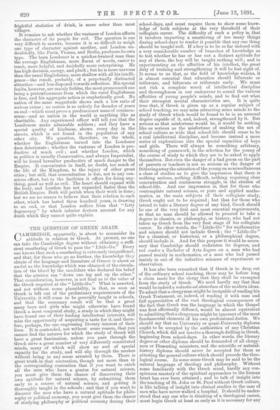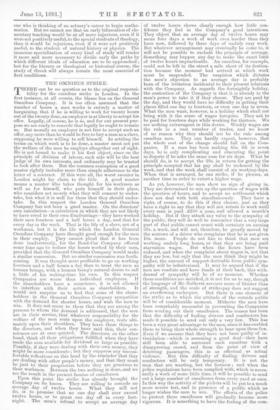THE QUESTION OF GREEK AGAIN.
CAMBRIDGE, apparently, is about to reconsider its attitude in relation to Greek. At present, no one can take the Cambridge degree without obtaining a suffi- cient smattering of Greek to pass the "Little-Go." Every one knows that such a smattering is extremely insignificant, and that, for those who go no further, the knowledge they obtain of the language and literature of Greece is about as useful as the knowledge which was obtained of the circula- tion of the blood by the candidate who declared his belief that the arteries ran "down one leg and up the other." That consideration, however, is not final as to the value of the Greek required at the "Little-Go." What is asserted, and not without some plausibility, is that, so soon as Greek is left out of the preliminary requirements of the University, it will cease to be generally taught in schools, and that the necessary result will be that a great many boys and girls who might otherwise have found Greek a most congenial study, a study in which they might have found one of their leading intellectual interests, will miss the opportunity of acquiring a taste for it, and there- fore, perhaps, the one engrossing literary interest of their lives. It is contended, not without some reason, that you cannot find the natures for which the study of Greek will have a great fascination, unless you pass through the Greek sieve a great number of very differently constituted minds, many of which will show no sort of special capacity for the study, and will slip through the meshes without being in any sense arrested by them. There is great truth in that contention, though not more than in the corresponding contention that if you want to catch all the men who have a genius for natural science, you must give them the chance of discovering their own aptitude for natural science, by submitting them early to a course of natural science, and getting it thoroughly taught in the schools ; and that if you want to discover the men who have a natural aptitude for philo- sophy or political economy, you must give them the chance of studying philosophy or political economy during their school-days, and must require them to show some know- ledge of both subjects at the very threshold of their collegiate career. The difficulty of such a policy is, that it involves imparting a smattering of too many things during school-days to render it possible that any one thing should be taught well. If a boy is to be so far imbued with a very considerable number of branches of knowledge as to test whether he has or has not a distinct aptitude for any of them, the boy will be taught nothing well; and in experimenting on the affinities of his intellect, the great duty of training and strengthening it will be lost sight of. It seems to us that, as the field of knowledge widens, it is almost essential that education should bifurcate or trifurcate, and bifurcate or trifurcate early. We must not risk a complete wreck of intellectual discipline and thoroughness in our endeavour to sound the various affinities of young people's minds, and to find out what their strongest mental characteristics are. It is quite true that, if Greek is given up as a regular subject of school teaching, we may miss attracting some minds to the study of Greek which would be found to be in an unusual degree capable of it, and, indeed, strengthened by it. But serious as that misfortune would be, it would be nothing like as serious as the misfortune of making the net of school culture so wide that school-life should cease to be a real intellectual discipline, and become instead a mere series of explorations into the special capacities of boys and girls. There will always be something arbitrary, something of guesswork, in the selection for the young of the course of study to which they are to be asked to apply themselves. But even the danger of a bad guess on the part of parents or teachers is not so serious as the danger of frittering away the attention of the young on so miscellaneous a. class of studies as to give the impression that there is nothing serious, nothing difficult, nothing requiring close concentration and continuous struggle, in the studies of school-life. And our impression is, that for those who contemplate natural science, or pure and applied mathe- matics, as the main subjects of their collegiate study, Greek ought not to be required ; but that for those who intend to take a literary degree of any kind, Greek should be one of the very first and most essential requirements, so that no man should be allowed to proceed to take a degree in classics, or philosophy, or history, who had not taken up Greek from the very first stage of his collegiate career. In other words, the " Little-Go" for mathematics and science should not include Greek ; the " Little-Go " for a classical, or historical, or a philosophical degree, should include it. And for this purpose it would be neces- sary that Cambridge should rechristen its degrees, and not confer a Bachelor of Arts degree on a man who had passed mainly in mathematics, or a man who had passed mainly in one of the inductive sciences of experiment or observation.
It has also been remarked that if Greek is to drop out of the ordinary school teaching, there may be before long a claim made for the clergy that they shall be exempted from the study of Greek. We need hardly say that that would be indeed a reductio aci absurdum of the modern ideas.
To admit that a clergyman might be incapable of reading his Greek Testament, or, indeed, of reading it with ease and full appreciation of the vast theological consequences of the fact that Greek was the language in which the Gospel was first effectually diffused, would be almost equivalent to admitting that a clergyman might be ignorant of the most fundamental elements of his own professional duties. We should say that no University or quasi-University diploma ought to be accepted by the authorities of any Christian Church, which did not involve a thorough drilling in Greek, beginning from school-days. In other words, the literary degree or other diploma should be demanded of all clergy- men or Dissenting ministers, and the scientific or natural- history diploma should never be accepted for them as attesting the general culture which should precede the thee- logical course. In some sense Greek may be said to be the natural language of theology and philosophy. Without some familiarity with the Greek mind, hardly any con- spicuous mastery of the spiritual approaches to the human heart has ever been attained ; and to talk of insight into the teaching of St. John or St. Paul without Greek culture, is like talking of insight into clinical studies in the case of men who have never walked a hospital. It should be under- stood that any one who is thinking of a theological career, must begin Greek at least as early as it is necessary for any one who is thinking of an actuary's career to begin mathe- matics. But we cannot see that an early bifurcation of ele- mentary teaching would be at all more injurious, even if it were not positively useful, to the special students of theology, than it would be injurious, even if it were not positively useful, to the student of natural history or physics. The immense specialisation of every kind of study will render it more and more necessary to divide early the paths by which different ideals of education are to be approached ; but for the literary or theological or historical course, the study of. Greek will always remain the most essential of first conditions.



































 Previous page
Previous page